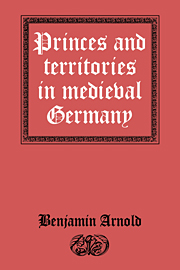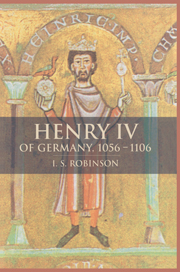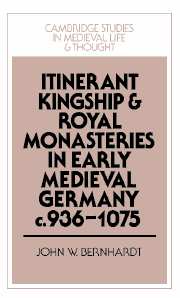Taking as its starting point two uprisings in England and Germany (Richard Marshal in 1233-4 and Henry (VII) in 1234-5), this book offers a new take on the political culture of high medieval Europe. Themes include: the role of violence; the norms of political behaviour; the public nature of politics; and the social history of political exchange.
Princes and Territories in Medieval Germany by Benjamin Arnold
 This book addresses the most important question in pre-modern German political history: why did a multiplicity of states and territories emerge by the end of the Middle Ages instead of an incipient 'nation state' under the crown? The answer is found not in the supposed failures of German kingship, but instead in the creative aristocratic successes of the secular dynasties and princes of the Church. We see how their collective efforts in the centuries after 1050 added up to a more markedly territorial structure of regional power, already emerging by the thirteenth century as a result of their endeavours in the economy, internal and external colonization, and the establishment of new castles, towns, monasteries and communications; in local, ecclesiastical and imperial law, and the jurisdictional reform which they imposed in their regions; and in the uses of dynastic politics, including feuds as well as alliances, inheritance and partition.
This book addresses the most important question in pre-modern German political history: why did a multiplicity of states and territories emerge by the end of the Middle Ages instead of an incipient 'nation state' under the crown? The answer is found not in the supposed failures of German kingship, but instead in the creative aristocratic successes of the secular dynasties and princes of the Church. We see how their collective efforts in the centuries after 1050 added up to a more markedly territorial structure of regional power, already emerging by the thirteenth century as a result of their endeavours in the economy, internal and external colonization, and the establishment of new castles, towns, monasteries and communications; in local, ecclesiastical and imperial law, and the jurisdictional reform which they imposed in their regions; and in the uses of dynastic politics, including feuds as well as alliances, inheritance and partition.
Henry IV of Germany 1056–1106 by IS Robinson
 This is the first book in English devoted to the German king and emperor Henry IV (1056–1106), whose reign was one of the most momentous in German history and a turning-point in the history of the medieval empire (the kingdoms of Germany, Italy and Burgundy). The reign was marked by continuous rebellions and fluctuating fortune. Earlier monarchs had also witnessed conflict between crown and aristocracy, but Henry IV's reign differed in that his conflicts could never be definitively resolved either by negotiation or by war. During the 1070s the young king gained a lasting reputation for tyranny, while his assertion of the crown's traditional rights over the imperial church aroused papal opposition. The alliance between the German princes and the papacy haunted Henry IV for the rest of his life. He meanwhile, by turns opportunist and compromiser, dedicated himself at all times to preserving the traditional rights of the monarchy.
This is the first book in English devoted to the German king and emperor Henry IV (1056–1106), whose reign was one of the most momentous in German history and a turning-point in the history of the medieval empire (the kingdoms of Germany, Italy and Burgundy). The reign was marked by continuous rebellions and fluctuating fortune. Earlier monarchs had also witnessed conflict between crown and aristocracy, but Henry IV's reign differed in that his conflicts could never be definitively resolved either by negotiation or by war. During the 1070s the young king gained a lasting reputation for tyranny, while his assertion of the crown's traditional rights over the imperial church aroused papal opposition. The alliance between the German princes and the papacy haunted Henry IV for the rest of his life. He meanwhile, by turns opportunist and compromiser, dedicated himself at all times to preserving the traditional rights of the monarchy.
Itinerant Kingship and Royal Monasteries in Early Medieval Germany, c.936–1075 by John W. Bernhardt
 In examining the relationship between the royal monasteries in tenth- and eleventh-century Germany and the German monarchs, this book assimilates a great deal of European scholarship on a central problem - that of the realities and structures of power. It focuses on the practical aspects of governing without a capital and while constantly in motion, and on the payments and services which monasteries provided to the king and which in turn supported the king's travel economically and politically. Royal-monastic relations are investigated in the context of the 'itinerant kingship' of the period to determine how this relationship functioned in practice. It emerges that German rulers did in fact make much greater use of their royal monasteries than has hitherto been recognised.
In examining the relationship between the royal monasteries in tenth- and eleventh-century Germany and the German monarchs, this book assimilates a great deal of European scholarship on a central problem - that of the realities and structures of power. It focuses on the practical aspects of governing without a capital and while constantly in motion, and on the payments and services which monasteries provided to the king and which in turn supported the king's travel economically and politically. Royal-monastic relations are investigated in the context of the 'itinerant kingship' of the period to determine how this relationship functioned in practice. It emerges that German rulers did in fact make much greater use of their royal monasteries than has hitherto been recognised.

No comments:
Post a Comment